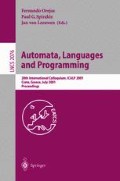Abstract
We give efficient algorithms, beating or matching optimal known bounds, for computing a variety of simulation relations on the state space of a Büchi automaton. Our algorithms are derived via a unified and simple parity-game framework. This framework incorporates previously studied notions like fair and direct simulation, but our main motivation is state space reduction, and for this purpose we introduce a new natural notion of simulation, called delayed simulation. We show that, unlike fair simulation, delayed simulation preserves the automaton language upon quotienting, and that it allows substantially better state reduction than direct simulation.We use the parity-game approach, based on a recent algorithm by Jurdzinski, to efficiently compute all the above simulation relations. In particular, we obtain an O(mn 3)-time and O(mn)-space algorithm for computing both the delayed and fair simulation relations. The best prior algorithm for fair simulation requires time O(n 6) ([HKR97]).
Our framework also allows one to compute bisimulations efficiently: we compute the fair bisimulation relation in O(mn 3) time and O(mn) space, whereas the best prior algorithm for fair bisimulation requires time O(n 10) ([HR00]).
Access this chapter
Tax calculation will be finalised at checkout
Purchases are for personal use only
Preview
Unable to display preview. Download preview PDF.
References
H. Andersen. Model checking and boolean graphs. TCS, 126(1):3–30, 1994.
D. Bustan and O. Grumberg. Checking for fair simulation in models with Büchi fairness constraints, Dec. 2000. Tech. Rep. TR-CS-2000-13, Technion.
B. Bloom and R. Paige. Transformational design and implementation of a new effcient solution to the ready simulation problem. Science of Computer Programming, 24(3):189–220, 1995.
D. L. Dill, A. J. Hu, and H. Wong-Toi. Checking for language inclusion using simulation relations. In Proceedings of CAV’91, pages 329–341, 1991.
K. Etessami and G. Holzmann. Optimizing Büchi automata. In Proc. of 11th Int. Conf on Concurrency Theory (CONCUR), pages 153–167, 2000.
O. Grumberg and D. Long. Model checking and modular verification. ACM Trans. on Programming Languages and Systems, 16(3):843–871, 1994.
M. Henzinger, T. Henzinger, and P. Kopke. Computing simulations on finite and infinite graphs. In Proc. of 36th IEEE Symp. on Foundations of Comp. Sci. (FOCS’95), pages 453–462, 1995.
T. Henzinger, O. Kupferman, and S. Rajamani. Fair simulation. In Proc. of 9th Int. Conf. on Concurrency Theory (CONCUR’97), number 1243 in LNCS, pages 273–287, 1997.
T. Henzinger and S. Rajamani. Fair bisimulation. In TACAS, 2000.
M. Jurdziński. Small progress measures for solving parity games. In STACS 2000, 17th Symp. on Theoretical Aspects of Computer Science, volume 1770 of LNCS, pages 290–301. Springer-Verlag, 2000.
N. Klarlund. Progress measures,immediate determinacy, & a subset construction for tree automata. Ann. Pure & Applied Logic, 69:243–268, 1994.
O. Kupferman and M. Y. Vardi. Weak alternating automata are not that weak. In Proc. 30th ACM Symp. on Theory of Computing, 1998.
R. Milner. Communicatation and Concurrency. Prentice-Hall, 1989.
R. Paige and R. E. Tarjan. Three partition-refinement algorithms. SIAM J. of Computing, 16(6):973–989, 1987.
F. Somenzi and R. Bloem. Efficient Büchi automata from LTL formulae. In Proceedings of 12th Int. Conf. on Computer Aided Verification, 2000.
I. Walukiewicz. Pushdown processes: games and model checking. In Computer Aided Verification, LNCS, pages 62–75. springer-verlag, 1996.
Author information
Authors and Affiliations
Editor information
Editors and Affiliations
Rights and permissions
Copyright information
© 2001 Springer-Verlag Berlin Heidelberg
About this paper
Cite this paper
Etessami, K., Wilke, T., Schuller, R.A. (2001). Fair Simulation Relations, Parity Games, and State Space Reduction for Büchi Automata. In: Orejas, F., Spirakis, P.G., van Leeuwen, J. (eds) Automata, Languages and Programming. ICALP 2001. Lecture Notes in Computer Science, vol 2076. Springer, Berlin, Heidelberg. https://doi.org/10.1007/3-540-48224-5_57
Download citation
DOI: https://doi.org/10.1007/3-540-48224-5_57
Published:
Publisher Name: Springer, Berlin, Heidelberg
Print ISBN: 978-3-540-42287-7
Online ISBN: 978-3-540-48224-6
eBook Packages: Springer Book Archive

